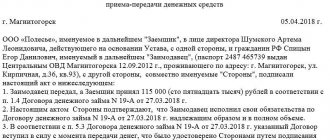How to correctly sign a deed of transfer under the DDU when accepting an apartment in a new building?
1. GENERAL PROVISIONS
1.1. This Privacy Policy regarding the processing of personal data of users of the site https://www.dvitex.ru/ (hereinafter referred to as the Privacy Policy) was developed and applied by Legal LLC, OGRN 1107746800490, Moscow, per. Golutvinsky 1st, building 3-5, office 4-1 (hereinafter referred to as the Operator) in accordance with paragraphs. 2 hours 1 tbsp. 18.1 of the Federal Law of July 27, 2006 No. 152-FZ “On Personal Data” (hereinafter referred to as the Law on Personal Data).
1.2. This Privacy Policy defines the Operator’s policy regarding the processing of personal data accepted for processing, the procedure and conditions for the processing of personal data of individuals who have transferred their personal data for processing to the Operator (hereinafter referred to as personal data subjects) with and without the use of automation tools, establishes procedures aimed at preventing violations of the legislation of the Russian Federation, eliminating the consequences of such violations related to the processing of personal data.
1.3. The privacy policy was developed to ensure the protection of the rights and freedoms of personal data subjects when processing their personal data, as well as to establish the responsibility of the Operator's officials who have access to the personal data of personal data subjects for failure to comply with the requirements and standards governing the processing of personal data.
1.4. Personal data of the Personal Data Subject is any information relating to a directly or indirectly identified or identifiable individual.
1.5. The Operator processes the following personal data of Users:
- Full Name;
- E-mail address;
- Phone number;
- other data necessary for the Operator when providing services to Users to ensure the functioning of the Site.
1.6. The Operator processes personal data of Personal Data Subjects for the following purposes:
- providing the opportunity for feedback from Operator Specialists on User requests;
- providing the possibility of online payment for services ordered on the Site;
- ensuring the fulfillment of the Operator’s obligations to Users;
- for market research purposes;
- informing the Personal Data Subject about promotions, competitions, special offers, new services, discounts, advertising materials and other services, as well as receiving commercial or advertising information and free products, participating in exhibitions or events, performing marketing research and notification of all special initiatives for clients;
- statistical purposes;
- for other purposes, if the corresponding actions of the Operator do not contradict the current legislation, the activities of the Operator, and the consent of the Personal Data Subject has been obtained for the said processing.
1.7. The operator processes personal data of personal data subjects by performing any action (operation) or set of actions (operations) performed using automation tools or without the use of such means, including the following:
- collection;
- record;
- systematization;
- accumulation;
- storage;
- clarification (update, change);
- extraction;
- usage;
- transmission (distribution, provision, access);
- depersonalization;
- blocking;
- deletion;
- destruction.
2. PRINCIPLES FOR PROCESSING PERSONAL DATA
2.1. When processing personal data, the Operator is guided by the following principles:
- legality and justice;
- confidentiality;
- timeliness and reliability of obtaining the consent of the subject of personal data for the processing of personal data;
- processing only personal data that meets the purposes of their processing;
- compliance of the content and volume of processed personal data with the stated purposes of processing. The personal data processed should not be redundant in relation to the stated purposes of their processing;
- the inadmissibility of combining databases containing personal data, the processing of which is carried out for purposes incompatible with each other;
- storing personal data in a form that allows identifying the subject of personal data for no longer than required for the purposes of processing personal data;
- destruction or depersonalization of personal data to achieve the goals, their processing or in case of loss of the need to achieve these goals.
2.2. The processing of personal data by the Operator is carried out in compliance with the principles and rules provided for:
- Federal Law of July 27, 2006 No. 152-FZ “On Personal Data”;
- This Privacy Policy;
- Universal Declaration of Human Rights 1948;
- International Covenant on Civil and Political Rights 1966;
- European Convention for the Protection of Human Rights and Fundamental Freedoms, 1950;
- The provisions of the Convention of the Commonwealth of Independent States on Human Rights and Fundamental Freedoms (Minsk, 1995), ratified by the Russian Federation on August 11, 1998;
- The provisions of the Okinawa Charter for the Global Information Society, adopted on July 22, 2000;
- Decree of the Government of the Russian Federation dated November 1, 2012 No. 1119 “On approval of requirements for the protection of personal data during their processing in personal data information systems”;
- Order of the FSTEC of Russia dated February 18, 2013 No. 21 “On approval of the composition and content of organizational and technical measures to ensure the security of personal data when processed in personal data information systems”;
- Other regulatory and non-regulatory legal acts governing the processing of personal data.
3. OBTAINING PERSONAL DATA.
3.1. Personal data of personal data subjects is obtained by the Operator:
- by providing the subject with personal data when registering on the Site, when submitting applications, applications, questionnaires, forms, filling out registration forms on the Operator’s website or sending by e-mail, messages by telephone to the Operator’s support service;
- by other means that do not contradict the legislation of the Russian Federation and the requirements of international legislation on the protection of personal data.
3.2. The Operator receives and begins processing the Subject’s personal data from the moment of receiving his consent.
3.3. Consent to the processing of personal data is given by the subject of personal data from the moment of starting to use the site, including by indicating about, through the performance of implied actions by the subject of personal data.
3.4. The subject of personal data may at any time withdraw his consent to the processing of personal data. To revoke consent to the processing of personal data, you must submit a corresponding application to the Operator via available means of communication. At the same time, the Operator must stop processing them or ensure the termination of such processing and, if the preservation of personal data is no longer required for the purposes of their processing, destroy personal data or ensure their destruction within a period not exceeding 30 (Thirty) days from the date of receipt of the specified review .
3.5. If the Personal Data Subject withdraws consent to the processing of personal data, the Operator has the right to continue processing personal data without the consent of the Personal Data Subject only if there are grounds specified in the Personal Data Law.
3.6. The subject of personal data has the right to choose what personal data will be provided to him. However, in case of incomplete provision of the necessary data, the Operator does not guarantee the subject’s ability to use all services and products of the Site, to use all services of the Site.
3.7. The personal data subject can view, update or delete any personal data included in his profile at any time. To do this, he can edit his profile online in his personal account or send an email to
4. PROCESSING PROCEDURE FOR PERSONAL DATA
4.1. The operator takes technical, organizational and legal measures to ensure the protection of personal data from unauthorized or accidental access, destruction, modification, blocking, copying, distribution, as well as from other unlawful actions.
4.2. When processing personal data, the Operator applies legal, organizational and technical measures to ensure the security of personal data in accordance with Art. 19 of the Federal Law “On Personal Data”, Decree of the Government of the Russian Federation dated November 1, 2012 No. 1119 “On approval of requirements for the protection of personal data during their processing in personal data information systems”, Methodology for determining current threats to the security of personal data during their processing in personal information systems data approved by the FSTEC of the Russian Federation on February 14, 2008, Methodological recommendations for ensuring the security of personal data using crypto-means when processing them in personal data information systems using automation tools approved by the FSB of the Russian Federation on February 21, 2008 No. 149/54-144.
4.3. To authorize access to the Site, a Login and Password are used. The subject of personal data is responsible for the safety of this information. The subject of personal data does not have the right to transfer his own Login and Password to third parties, and is also obliged to take measures to ensure their confidentiality.
4.4. When transferring personal data, the Operator complies with the following requirements:
- does not disclose the personal data of the subject of personal data to a third party without expressed consent, except in cases where this is necessary for the purposes of processing personal data, preventing a threat to the life and health of the subject of personal data, as well as in cases established by law;
- does not disclose personal data for commercial purposes without the expressed consent of the subject of personal data;
- informs persons receiving personal data that this data can only be used for the purposes for which it was communicated, and requires these persons to take appropriate measures to protect personal data. Persons receiving the User’s personal data are required to maintain confidentiality;
- allows access to personal data only to authorized persons, and these persons must have the right to receive only those personal data that are necessary to perform specific functions.
4.5. The Operator has the right to disclose any information collected about the User of this Site if disclosure is necessary in connection with an investigation or complaint regarding unlawful use of the Site, or to identify (identify) a User who may violate or interfere with the rights of the Site Administration or the rights of other Site Users, as well as to comply with the provisions of current legislation or court decisions, ensure compliance with the terms of this Agreement, protect the rights or safety of other Users and any third parties.
4.6. Third parties independently determine the list of other persons (their employees) who have direct access to such personal data and (or) process it. The list of these persons, as well as the procedure for access and/or processing of personal data by them, is approved by the internal documents of the Third Party.
4.7. The operator does not sell or provide personal data to third parties for marketing purposes not provided for in this Privacy Policy, without the express consent of the personal data subjects. The operator may combine anonymized data with other information received from third parties and use it to improve and personalize services, content and advertising.
4.8. Processing of personal data is carried out on the territory of the Russian Federation; cross-border transfer of personal data is not carried out. The operator reserves the right to choose any channels for transmitting information about personal data, as well as the content of the transmitted information.
4.9. Personal information collected online is stored by the Operator and/or service providers in databases protected by physical and electronic controls, access control technology and other appropriate security measures.
4.10. The personal data subject understands, confirms and agrees that the technical processing and transmission of information on the Operator’s Website may involve the transfer of data over various networks, including unencrypted communication channels on the Internet, which is never completely confidential and secure.
4.11. The personal data subject also understands that any messages and/or information sent through the Operator’s Server may be unauthorized read and/or intercepted by third parties.
5. FINAL PROVISIONS
5.1. In the event of any disputes or disagreements related to the implementation of these Rules, the Personal Data Subject and the Operator will make every effort to resolve them through negotiations between them. If disputes are not resolved through negotiations, disputes shall be resolved in the manner established by the current legislation of the Russian Federation.
5.2. This Privacy Policy comes into force for the Personal Data Subject from the moment he starts using the Operator’s Website and is valid for an indefinite period.
5.3. This Privacy Policy can be changed and/or supplemented by the Operator at any time during the validity period of the Rules at its discretion without the need to obtain the consent of the Personal Data Subject. All changes and/or additions are posted by the Operator in the appropriate section of the Site and come into force on the day of such posting. The subject of personal data undertakes to promptly and independently familiarize himself with all changes and/or additions. If the Personal Data Subject does not agree with the changes made, he is obliged to refuse access to the Site and stop using the materials and services of the Site.
How to register property rights
What to do next after accepting the apartment? Prepare for your visit to the Registration Chamber with the necessary documents. And here are the possible options:
- registration is carried out by the developer, having previously received a power of attorney from each shareholder;
- buyers take the initiative into their own hands and resolve design issues on their own.
The first option may be unprofitable for the buyer for a number of reasons:
- the developer has nowhere to rush. The house is rented, apartments are sold, money is coming in. The fact that buyers cannot register on legal meters is their personal problem. In addition, one complex can have several thousand apartments. Preparation of documents takes a long time;
- the buyer, if the living space was purchased with borrowed funds, until the title and mortgage are registered, pays the bank increased interest (+ 2, 2.5 percentage points to the base rate).
After registering the right, it is necessary to write an application to the bank to reduce the interest rate, if this is provided for by the terms of the loan agreement.
Choosing the second option means that you have to go through all the bureaucratic procedures yourself. If the developer himself does nothing and does not issue documents to the shareholders, he will need to go to court.
Floor
Having entered the apartment and effortlessly closed the door behind us, we look at the floor. Here's a short list of what we shouldn't see there:
- cracks and holes through which the floor below is visible;
- large cracks and unexpected bumps;
- puddles and mold.
If good vision is enough to detect everything listed above, then the difference in heights will not be visible to the naked eye. But if the floor at the entrance is more than a couple of centimeters higher or lower than the floor at the window, you will definitely encounter difficulties when covering it with laminate or linoleum. So, when accepting, don’t be too lazy to use a building level and check if there are differences in different places in the apartment. While you are checking, at the same time lightly tap the floor - the sound should be clear, without voids.
Apartment insurance
Remember the list of documents from the last section? Now add an extract from the Unified State Register there, and it’s time to go to the bank to take out insurance for your apartment.
There are two options here:
- Buy a policy from an affiliated bank company.
- Buy a policy from another insurance company that you prefer.
In the first case, everything is done in the bank itself. In the second, you need to come to the bank with the policy for confirmation.
That's all. Now all you have to do is pay your mortgage on time to avoid late payments and renew your insurance annually.
Payment of the state fee for registration
Regardless of the chosen method, before submitting documents, you must pay the state fee for completing registration actions. As of 2021, the buyer transfers 2,000 rubles . Basis - art. 333.33 Tax Code of the Russian Federation. The list of persons entitled to benefits when paying state fees is indicated in paragraphs. 24 clause 1 art. 333.33 Tax Code of the Russian Federation.
From 2021, it is not necessary to provide a payment order or receipt to Companies House. Employees independently check the availability of payment in the GIS GMP. The payer can present a receipt if less than 24 hours have passed since the transfer and only on a voluntary basis.
If the registration chamber employee insists on presenting a receipt, you can complain about him to higher authorities. Moreover, registration documents must be accepted even if payment has not yet been made at all. But within 3 days it is better to transfer the required amount. Otherwise, registration actions will not be carried out.
When paying the state fee, it is important to follow the following rules:
- Each owner contributes money on his own behalf and with a separate receipt. Payments for third parties are not accepted;
- if the premises have several buyers, the state duty is proportionally divided among everyone, including children. Two owners - each pays 1000 rubles, four - 500 rubles each;
- if a minor is under 14 years of age, legal representatives pay for him, but in the name of the child;
- There should be no errors in payments. An incorrectly written letter in a surname or given name is grounds for refusal of registration. It is possible to return an erroneous payment, but the procedure takes time;
- if the apartment is purchased as joint property by spouses, the fee can be paid by one of them.
Available methods for registering real estate in the Unified State Register of Real Estate
What to do after accepting an apartment in a new building? Register ownership of real estate. Available methods:
- directly through Companies House;
- At the MFC. If a particular city provides electronic registration, you can book a specific time. MFC employees do not check the correctness of filling out documents, the presence/absence of encumbrances and other possible reasons for refusal of registration. Their task is to accept documents and transfer them to the Chamber. Accordingly, the total review period is increased by 4 working days;
- Via Russian Post with a description of the attachment. The post office employee checks the documents and seals the letter. Taking into account the timing of delivery across the country, the process of receiving a response may take several months;
- Through the intermediary of banks. In particular, Sberbank has provided a special service for sending documents for registration in electronic format. Read more in the article - Pros and cons of electronic registration of a transaction in Sberbank
Recommended article: Which bank to take out a mortgage on a land plot (documents, requirements)
There are 5-9 days to check and carry out the procedure. If deficiencies are identified, the documents are returned to the applicant indicating the reason for the refusal.
Important! Documents for the same reason cannot be returned for correction twice.
Collateral insurance
What to do after accepting the apartment? After registering the title and collateral, it must be insured in favor of the creditor for an amount not less than the appraised value. The main risks are determined by the bank. This may be loss of ownership, destruction as a result of malicious actions of third parties or natural disaster.
Each insurer offers its own list of services and payment procedure in the event of an insured event. Banks create lists of accredited companies. The borrower is invited to insure the collateral in one of them.
If the buyer acts at his own discretion and purchases a policy from an unaccredited company, the bank may refuse to accept insurance. The inevitable consequence is fines and increased interest rates.
When recognition of rights through court may be required
In a number of situations, the buyer of a home in a new building is forced to prove through the court his right to live in the purchased apartment. This happens if the developer:
- He does not independently resolve organizational issues and does not issue the necessary documents to shareholders, and avoids signing the transfer and acceptance certificate.
- Declared bankrupt. His property has been seized and is subject to electronic auction.
- Fails to fulfill obligations to the local administration, for example, to allocate living space for the resettlement of emergency houses. In most cases, square meters are offered as a means of payment for obligations. Filing a claim in a timely manner means you can stay in your apartment. If, for various reasons, the living space is nevertheless transferred to the administration or another creditor of the developer, compensation can be demanded based on a court decision.
The main thing when applying to the courts is to competently draft a statement of claim, indicate and argue your claims, and provide supporting documents.
Entrance door
The theater begins with a coat rack, and the apartment begins with the front door. You can ignore it upon acceptance only if the developer immediately declares that he is installing it as a replacement. In any other case, do not forget to make sure that the door corresponds to all early promises - is it the right height, the right material, the right manufacturer? Open and close it several times to make sure that you do not need to put any extra effort into it, and that the locks, handles and hinges work properly. Finally, simply inspect the door for chips and scratches. Was it damaged when they installed the same door for a neighbor? True, the decision about whether to agree to a slightly damaged door is up to you. Replacement will definitely take time, which may cost you more than even a new reliable door.
Information disclosure
At any stages of shared construction (both before delivery and after putting the entire house into operation), the developer is obliged, at the request of participants in shared construction, to disclose all information and provide free, open and full access to it. In the first part of Art. 3 of Law 214-FZ states that information must be regularly and timely posted in the media and in telecommunication networks, in the unified information system of housing construction.
The developer who accepts funds contributed by participants in shared construction undertakes to provide the following list of information and documentation:
- permission to put a completed completed house into operation
- project declaration and all amendments to it
- financial statements for the past year with interim reports (for the 1st quarter, the past six months and 9 full months)
- feasibility study of the construction project
- conclusion of the examination of the above design documentation
- documents proving the developer's legal rights to a plot of land (for example, a lease agreement or a certificate confirming registered ownership)
- conclusion of the authorized executive authorities of a separate entity that the developer and his project declaration comply with the requirements of the law
- draft agreement for participation in shared construction (sample DDU)
- urban planning plan of the territory (schematic map)
- photos of shared construction projects under construction, reflecting the actual condition of the house under construction
- information about the initiated bankruptcy procedure
- data on the opening and closing of current accounts, indicating their numbers, names of banks and their individual identifiers
- documents confirming payment of taxes (certificate of registration with the tax authority - Federal Tax Service);
- other documents provided for by law
The developer is responsible for failure to fulfill its legal and contractual obligations. The rights of shareholders are protected. Concealment or refusal to provide information to a construction company is punishable by a fine of 200 to 400 thousand rubles.








